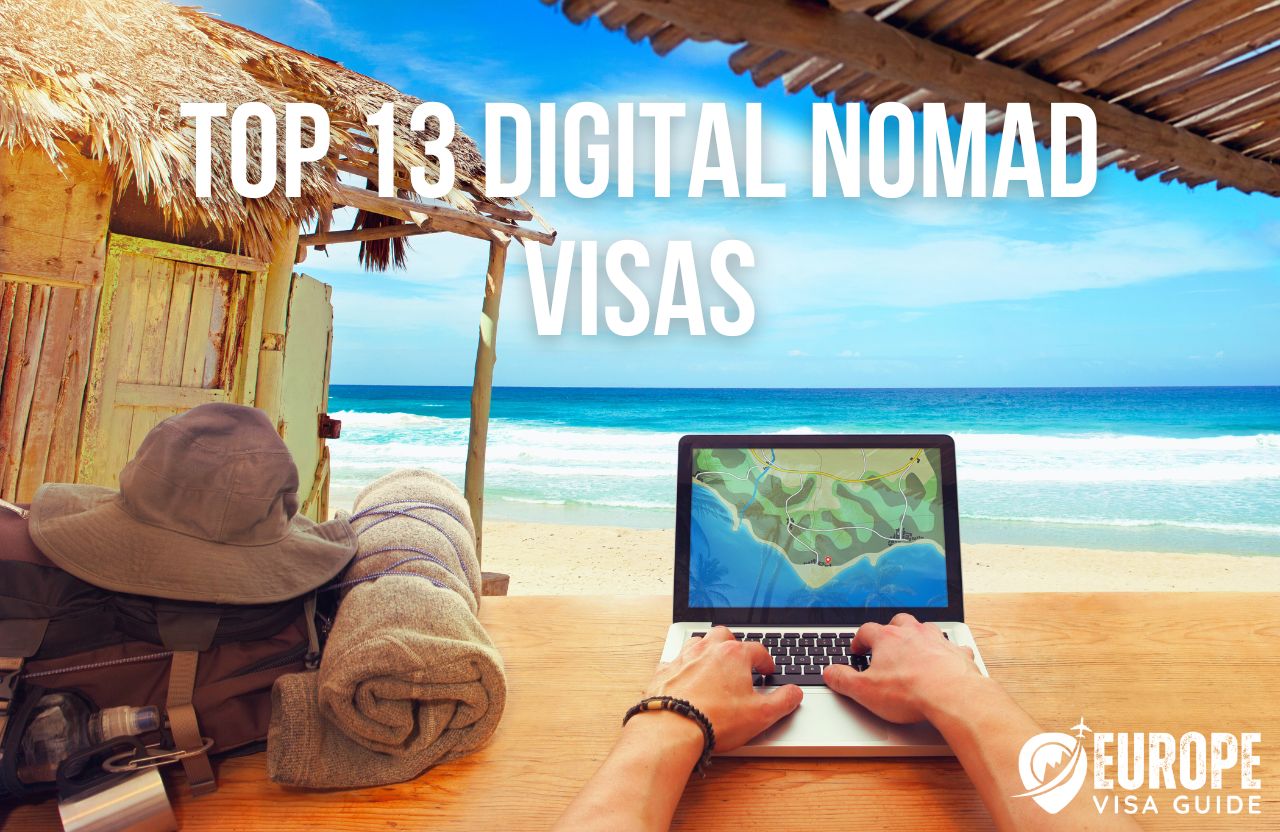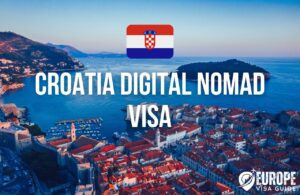
Table of Contents
Are you ready for a taste of the European lifestyle? If so, why not consider one of Europe’s digital nomad visas? The COVID-19 pandemic has opened up the potential of remote work and inspired many people to become digital nomads. In response, countries all over the world have created specific digital nomad visas to encourage remote workers to travel there for extended periods of time. Europe is no exception, with more and more countries introducing these visas. In this article, we will explore the top 13 digital nomad visas for easy access to Europe in 2024.
What is a Digital Nomad Visa?
A digital nomad visa is a type of visa that allows remote workers to stay in a country for an extended period of time while working remotely for their foreign employer or clients. In the past, people who worked remotely while traveling usually did so on tourist visas, which often did not allow them to work legally. Digital nomad visas were created to fill the gap between short-term tourist visas and long-term work permits.
European digital nomad visas typically allow non-EU citizens to stay in the Schengen zone for longer than the usual 90-day limit. These visas usually require applicants to show proof of sufficient funds, proof of their business activity, and a clean criminal record. It’s important to note that most digital nomad visas are non-renewable and cannot be used as a pathway to permanent residency or citizenship. However, there are a few exceptions to this rule.
13 Digital Nomad Visas for Easy Access to Europe
Here is a comprehensive roundup of 13 digital nomad visa countries in Europe that provide easy access to the continent.
1. Estonia’s Digital Nomad Visa
Estonia was the first country in Europe to introduce a digital nomad visa in the summer of 2020. The Estonia digital nomad visa is valid for up to one year and allows remote workers and freelancers to work from Estonia for their own overseas registered business or for a foreign employer. To obtain the digital nomad visa, applicants need to apply through an Estonian embassy or consulate abroad, and applications are usually reviewed within 30 days.
Read more about the Estonia digital nomad visa
2. Croatia’s Digital Nomad Visa
Croatia launched its digital nomad visa in 2021, which is valid for up to one year and comes with tax exemptions. This visa also allows remote workers to bring their immediate family members with them. The requirements for the Croatia digital nomad visa include a clean criminal record, a rental contract in Croatia, health insurance, and proof of sufficient remote income. Applications for the visa can be made online, and decisions are typically made within 20 days.
Read more about the Croatia digital nomad visa
3. Italian Self-Employment Visa
Italy introduced new tax incentives in January 2020 to encourage remote workers to move there. Although not technically a digital nomad visa, the Italian self-employment visa offers resident freelancers a reduced tax rate of 70% on any income generated in Italy. The visa is valid for two years from the date of issue, with the possibility of extension. To apply for the Italian self-employment visa, individuals need to make an appointment at the closest Italian embassy in their country of residence and provide proof of sufficient income, accommodation in Italy, and health insurance.
Note: Italy is currently working on a new digital nomad visa, which is expected to be launched by the end of 2023.
4. The Greek Digital Nomad Visa
Greece offers a digital nomad visa that is valid for up to 12 months, with the option to apply for a residence permit for longer stays. To be eligible for the visa, applicants need to show proof of a monthly income of at least €3,500, suitable health insurance coverage, and work remotely for a company or clients located outside of Greece. Self-employed individuals need to submit confirmation of their business activity, corporate purpose, and business address, with the business not being registered in Greece.
Read more about the Greece digital nomad visa
5. Germany’s ‘Freiberufler’ Visa
Germany has long offered a freelancer visa, known as ‘freiberufler’ visas in German. These visas are available for professionals and artists and require applicants to have clients based in Germany. Therefore, this visa may not be suitable for remote workers who work for a foreign employer. The application process for the ‘freiberufler’ visas is more involved, requiring registration with the German tax office and the submission of documents such as bank statements, a work portfolio, and proof of expertise. Despite the complexities, the ‘freiberufler’ visas can be a good option for those planning to move to Germany.
6. Czech Republic: Zivno Business Visa
The Czech Republic offers a special business visa for freelancers and remote workers called the Zivno business visa. To apply for this visa, individuals need to obtain a trade license before applying for a business visa. Other requirements include health insurance, sufficient funds, and proof of accommodation for at least one year. The visa application needs to be made in person at a Czech consulate in the applicant’s country of residence, often involving an interview to discuss the business and why the Czech Republic is chosen for remote work. The Zivno visa can lead to long-term Czech residency and potentially even citizenship.
7. Hungary Digital Nomad Visa: “White Card”
Hungary offers a digital nomad visa known as the “White Card,” which allows foreign remote workers to live in Hungary while working for foreign employers. The White Card is valid for one year and can be extended for an additional year, but it does not provide a pathway to permanent residency or citizenship. To be eligible, applicants need to be non-EU/EEA and non-Swiss citizens and work remotely for an employer outside of Hungary or their own registered company. The application process involves applying for an entry visa at the nearest Hungarian consulate, followed by applying for the White Card within 30 days of entering Hungary.
8. Iceland’s Digital Nomad Visa
Iceland offers a digital nomad visa for foreigners who want to work remotely in Iceland for longer than six months. The visa also allows individuals to bring their families with them. To be eligible, applicants need to provide proof of employment, sufficient funds, and adequate health insurance coverage.
9. Malta’s Digital Nomad Visa
Malta has introduced a renewable one-year digital nomad visa aimed at non-EU nationals who want to maintain their existing jobs or freelance work while living in Malta. Applicants need to show proof of COVID-19 vaccination, health insurance, and a monthly gross income of at least €2,700 from an organization outside of Malta.
10. Portugal Digital Nomad Visa
Portugal offers two routes for digital nomads: the temporary stay visa for digital nomads in Portugal and the long-term residency visa for digital nomads in Portugal. The temporary stay visa allows digital nomads to stay in Portugal for up to one year, while the long-term residency visa for digital nomads must be converted into a residence permit within four months of arrival in Portugal.
The long-term residency visa for digital nomads can be used as a pathway to eventual Portuguese citizenship after five years. Both routes for digital nomads in Portugal require proof of a minimum salary of €3,040 per month and 12 times that sum held in a Portuguese bank account. Importantly, the temporary stay visa for digital nomads in Portugal does not require conversion into a residence permit.
Read more about the Portugal digital nomad visa
11. Spain Digital Nomad Visa
Spain is set to launch a digital nomad visa soon, allowing foreign workers for non-Spanish companies to work remotely in Spain. The existing non-lucrative visa in Spain is not suited for digital nomads, especially those employed on contracts. The new digital nomad visa, known as the “digital nomad visa of Spain,” is expected to be valid for one year, with the option to renew it for two additional years.
Read more about the Spain digital nomad visa
12. Norway’s Independent Contractor Visa
Norway offers an independent contractor visa, which allows non-EU/EEA foreigners to live and work in Norway for up to two years. This visa requires at least one Norwegian client, making it more similar to freelancer visas in Germany and the Czech Republic. To apply for the Norway digital nomad visa, applicants need to prove that their business is incorporated outside of Norway and show a minimum annual income of €35,719, along with bank statements and an address in Norway.
13. Finland’s Self-Employment Visa
Finland offers a self-employment visa that allows individuals to stay in the country for six months. To be eligible, applicants need to provide bank statements showing a monthly income of at least €1,220 from a company incorporated outside of Finland. Additional documents from the applicant’s company, such as incorporation certificates and shareholders’ registers, may be required for evaluation.
FAQs: Digital Nomad Visas in Europe
Who qualifies for digital nomad visas?
Generally, anyone over the age of 18 who can prove a specific level of income per month and works remotely from anywhere in the world can qualify for a digital nomad visa. However, the requirements may vary from country to country.
How much do you need to earn to get a digital nomad visa in Portugal?
To obtain a digital nomad visa in Portugal, you need to earn at least €2,820 per month.
How hard is it to get a digital nomad visa?
Getting a digital nomad visa is not particularly difficult if you work remotely and meet the income requirements. You may also need to obtain private health insurance and provide proof of accommodation in the target country.
In conclusion, 2024 is shaping up to be a great year for digital nomads looking to explore Europe. With the introduction of various digital nomad visas, remote workers have more opportunities to experience the European lifestyle while continuing their work. Each country offers its own unique benefits and requirements, so it’s essential to research and choose the visa that best suits your needs. Whether you’re drawn to the tech-savvy Estonia, the beautiful beaches of Croatia, or the historical charm of Italy, there’s a digital nomad visa waiting for you in Europe. Start planning your adventure today!





